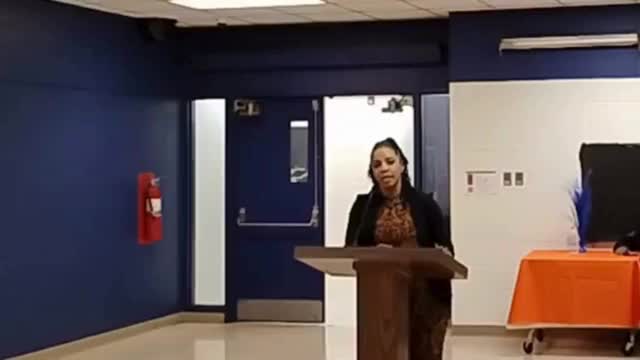Gary residents and school leaders oppose Indiana House Bill 1136 at school board meeting
Get AI-powered insights, summaries, and transcripts
Subscribe
Summary
Gary Community School Corporation trustees and dozens of residents used the board's Jan. 8 meeting to hear details about and register opposition to Indiana House Bill 1136, proposed state legislation that would dissolve certain school districts and require many district-run schools to convert to charter schools if a majority of resident students attend non-district schools.
Gary Community School Corporation trustees and dozens of residents used the board's Jan. 8 meeting to hear details about and register opposition to Indiana House Bill 1136, proposed state legislation that would dissolve certain school districts and require many district-run schools to convert to charter schools if a majority of resident students attend non-district schools.
Chelsea Whittington, chief of public and community relations for the Gary Community School Corporation, presented excerpts of the bill and a chart showing the local data cited in the proposal. Whittington said the district had 11,764 resident students and 4,144 enrolled in district schools, and that the presentation’s figures showed roughly 65% of resident students attending schools outside the corporation. “This chart indicates that we currently have 11,764 students residing in the school corporation of which 4,144 are enrolled in our School Corporation,” Whittington said during the presentation. She emphasized the district had seen a recent upward trend in enrollment following the end of state control in July 2024: a fall increase of 214 students and an additional 153 students added afterward, figures she said the district expects to continue to grow.
The presentation attributed the bill’s authorship to Rep. Jake Teshka and listed Representatives Jeffrey Thompson and Timothy O’Brien as co‑authors, and summarized the bill’s reported mechanics: if more than 50% of students residing in a district’s boundaries were enrolled outside the district on the October 1 annual count, the district could be dissolved and many schools converted to charter operation by July 1, 2028. Whittington framed the district’s briefing as informational and urged residents to contact the bill’s author and their representatives; she provided phone numbers on the public slide deck and said the district would publish the superintendent’s statement and further materials on garyschools.org and the district’s social channels.
Public commenters filled the meeting’s public comment period with objections. Carolyn McCready said the measure was a privatization effort and urged community organizing: “If we don’t stand up as a community … we are going to have a full‑fledged effort,” she said. Bruce Curry, who identified himself as lead for education for the NAACP, described the bill as an equity issue and said NAACP leaders were coordinating a response. “This is an equity issue,” Curry said. Tracy Coleman, a longtime district critic of past governance failures, told the board the community had limited time to respond and urged a coordinated legislative and public campaign to stop the bill.
Other speakers – including Natalie Evans, Dr. Kayla Englenberg (who said she was standing with the Security Education Coalition), and several parents and alumni – likewise urged the board and community to oppose the bill and to mobilize to inform legislators and the public. Dr. Englenberg warned that the bill’s language could be modified later and that dissolution could be the first step in broader reductions to public education across the state.
Superintendent Dr. Yvonne Stokes’ statement, read and distributed by staff, reminded attendees that the district had been released from a seven‑year state takeover on July 1, 2024, and that the enrollment counts cited in the bill reflect an October 1 snapshot taken early in the 2024–25 school year. “Since local control was reinstated we have been laser focused on increasing enrollment and maintaining financial solvency while enhancing curriculum and improving the overall educational experience for children,” the statement read.
The board did not take formal action on HB 1136 at the meeting. Trustees and staff announced plans to publish information and to convene community forums; Whittington said the district would post a FAQ and contact information for state legislators and the bill’s author on the district website. Whittington also provided two phone numbers shown during the presentation for constituents to use to contact legislators and staff: 317‑232‑9731 and 800‑382‑9841.
Why it matters: The proposal described in HB 1136 would shift governance and school operations from locally elected school boards to charter operators in affected districts if the bill’s tests are met, a change speakers said would remove local control and could affect staffing, curricula and district finances. Board and community speakers framed the issue as urgent and as requiring coordinated outreach to legislators.
What’s next: Board members said the district will continue outreach and information postings on its website and social channels, and community organizations in Gary said they planned coordinated legislative engagement in the coming days and weeks.
